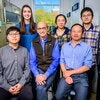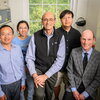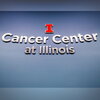
Contact Information
419 Roger Adams Lab.
University of Illinois
600 S. Mathews Avenue
Urbana, IL 61801
Research Interests
Research Topics
Drug Discovery, New Signal Transduction Pathways, Endocrinology, Cell Death Pathways and Immunotherapy, Protein-Nucleic Acid Interactions, Receptor Biochemistry, Regulation of Gene Expression
Disease Research Interests
Cancer, Drug Discovery, Cancer Cell Death Pathways to Enhance Immunotherapy, Neurological and Behavioral Disorders, Trauma
Research Description
Identification and use of small molecule biomodulators as novel anticancer drugs and probes for new regulatory pathways: ErSO, a novel small molecule biomodulator uses our recently unveiled pathway to eradicate advanced breast, ovarian, endometrial and other types of cancer.
More than 90% of cancer deaths are due to metastases, or spread, of the cancer. Nearly all metastatic cancers are incurable and most patients die within a few years. Therefore, our goal is to use our expertise in genome-wide CRISPR Screens with Negative Selection, high throughput screening, cell line development, 3-dimensional cell culture, endocrinology and animal models to identify new pathways in cancer, and small molecules that target them. From a program with Chemistry Professor, Paul Hergenrother, we identified a novel small molecule, ErSO, that often induces complete regression without recurrence of large, therapy-resistant breast tumors and of lung, bone, and liver metastases. Moreover, ErSO is also highly effective in mouse xenograft models of several other major cancers and in samples from breast and ovarian cancer patients. ErSO’s unprecedented activity against advanced primary and metastatic cancers is achieved by exploiting our finding that estrogen-estrogen receptor (ER) activates an extranuclear tumor-protective, signaling pathway, termed the anticipatory unfolded protein response (a-UPR). We repurposed this tumor protective pathway by targeting it with ErSO. ErSO kills cancer cells by inducing lethal hyperactivation of the a-UPR, triggering rapid necrotic cell death. This game-changing turn-on strategy contrasts with widely used inhibition strategies.
A Pathway for Anticancer Therapy Induced Necrotic Cell Death
Although immunotherapy has transformed cancer therapy, it mostly fails against solid tumors. One way to enable immunotherapy is to couple it with agents that kill cancer cells in a way that activates immune cells. Unlike apoptosis and autophagy inducers, which usually do not activate immune cells, ErSO kills cancer cells by inducing immune-cell-activating necrosis. But necrosis lacked protein markers, limiting development of targeted therapeutics. From a Genome-wide CRISPR-Cas9 Screen with Negative Selection against our necrosis inducing drugs, we identified the key executioner protein in anticancer therapy induced necrosis. Notably, four unrelated necrosis inducing cancer therapies also work, at least in part, through this pathway. Additional pathway components have been identified; unveiling the necrosis pathway, targeting it therapeutically and using it to enhance immunotherapy are areas of current and future investigation.
Education
B.S. 1967 Brooklyn College
Ph.D. 1972 Purdue University
Postdoc. 1972-1973 Stanford University Medical School, 1973-1974 Stanford University
1985 - 1986 Guggenheim Fellow, Center for Cancer Research MIT
Awards and Honors
08/2023 Genetic Engineering and Biotechnology News: “Key Driver of Necrosis in Cancer Cells Identified”
07/2023 Science Daily: “Team identifies key driver of cancer cell death pathway that activates immune cells”
Eugene Howe Scholar in Biochemistry, 2016-2021
08/2021 Scripps TV interview (60 stations) “Researchers develop breakthrough compound that kills breast cancer in animals”
08/2021 Nature Reviews Drug Discovery: “UPR activator eliminates breast tumours”
07/2021 Fierce Biotech: “Bayer’s drug that turns a cancer-protective pathway toxic eradicates breast tumors in mice”
07/2021 Medical News Today: “Drug rapidly shrinks metastatic breast cancers in mice”
Some Financial Awards: Guggenheim Fellow, NIH Research Career Development Award
Additional Campus Affiliations
External Links
Highlighted Publications
Representative Publications
Boudreau, M.W., Duraki, D., Wang, L., Mao, C., Kim, J.E., Henn, M.A., Tang, B., Fanning, S.W., Kiefer, J., Tarasow, T.M., Bruckheimer, E.M., Moreno, R., Mousses, S., Greene, G.L., Roy, E.J., Park, B.H., Fan, T.M. Nelson, E.R., Hergenrother. P.J. and Shapiro D.J. 2021. A Small Molecule Activator of the Unfolded Protein Response Eradicates Human Breast Tumors in Mice. Science Translational Medicine, online July 21, 2021. DOI: 10.1126/scitranslmed.abf1383
Yu, L., Wang, L., Kim, J.E., Mao, C., and Shapiro, D.J. (2020) Src Couples Estrogen Receptor to the Anticipatory Unfolded Protein Response and Regulates Cancer Cell Fate Under Stress. Biochim Biophys Acta Mol Cell Res. DOI: 10:1016/j.bbamcr2020.118765, PMCID: PMC 7653967
Yu, L., Wang, L., Mao, C., Duraki, D., Kim, J.E. Huang, R. Helferich, W.G. Nelson, E.R., Park, B.H. and Shapiro D.J. (2019) Estrogen-Independent Myc Overexpression Confers Endocrine Therapy Resistance on Breast Cancer Cells Expressing ERαY537S and ERαD538G Mutations, Cancer Letters, 442: 373-382.
Livezey, M., Huang, R., Hergenrother, P.J., and Shapiro, D.J. (2018) Strong and Sustained Activation of the Anticipatory Unfolded Protein Response Induces Necrotic Cell Death. Cell Death and Differentiation, 25:1796-1807 (C. Wraight Award: Dept. of Biochem., The Outstanding Graduate Student Paper of 2018)
Zheng, X., Andruska, N., Lambrecht, M., He, S., Parissenti, A., Hergenrother, P,, Nelson, E.R., and Shapiro, D.J. (2016) Targeting Multidrug Resistant Ovarian Cancer Through Estrogen Receptor α Dependent Hyperactivation of the UPR. Oncotarget, 9: 14741-14753 (C. Wraight Award: Dept. of Biochem., The Outstanding Graduate Student Paper of 2016)
Andruska, N., Zheng, X., Yang, X., Mao, C., Cherian. M., Mahapatra, L,, Helferich, W.G. and Shapiro, D.J. (2015) An estrogen receptor α inhibitor activates the unfolded protein response, blocks protein synthesis and induces tumor regression. Proc. Nat.l Acad. Sci. USA, 112(15) 4737-4742 (highlighted paper)
Recent Publications
Duraki, D., Jabeen, M., Mao, C., Wang, L., Ghosh, S., Dai, X., Zhu, J., Boudreau, M. W., Nelson, E. R., Hergenrother, P. J., Cheng, G., & Shapiro, D. J. (2025). A necrosis inducer promotes an immunogenic response and destroys ovarian cancers in mouse xenografts and patient ascites organoids. Cancer Letters, 625, Article 217738. https://doi.org/10.1016/j.canlet.2025.217738
Mulligan, M. P., Boudreau, M. W., Bouwens, B. A., Lee, Y., Carrell, H. W., Zhu, J., Mousses, S., Shapiro, D. J., Nelson, E. R., Fan, T. M., & Hergenrother, P. J. (2025). Single Dose of a Small Molecule Leads to Complete Regressions of Large Breast Tumors in Mice. ACS Central Science, 11(2), 228-238. https://doi.org/10.1021/acscentsci.4c01628
Zhu, J., Dai, X., Ghosh, S., Wei, E., Mao, C., Jiang, Q., Spaulding, A. J., Mulligan, M. P., Romero, R., Han, Y. J., Boudreau, M. W., Olopade, O., Hergenrother, P. J., & Shapiro, D. J. (2025). FGD3 mediates lytic cell death, enhancing efficacy and immunogenicity of chemotherapy agents in breast cancer. Journal of Experimental and Clinical Cancer Research, 44(1), Article 299. https://doi.org/10.1186/s13046-025-03559-5
Hergenrother, P. J., Shapiro, D. J., & Boudreau, M. W. (2024). Activators of the unfolded protein response. (U.S. Patent No. 12180159).
Oh, T. J., Krishnamurthy, V., Han, J. W., Zhu, J., Beg, Z., Mehfooz, A., Gworek, B., Shapiro, D. J., & Zhang, K. (2024). Spatiotemporal Control of Inflammatory Lytic Cell Death Through Optogenetic Induction of RIPK3 Oligomerization. Journal of Molecular Biology, 436(13), Article 168628. https://doi.org/10.1016/j.jmb.2024.168628




